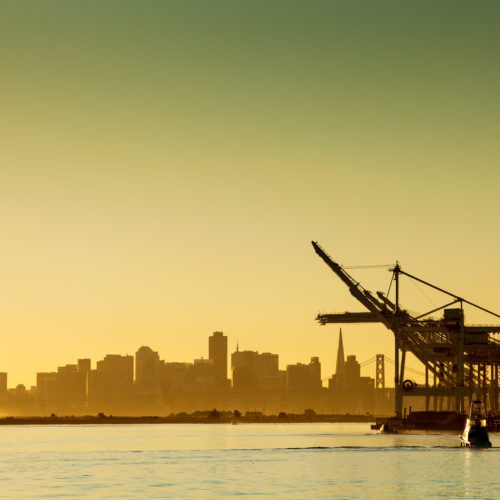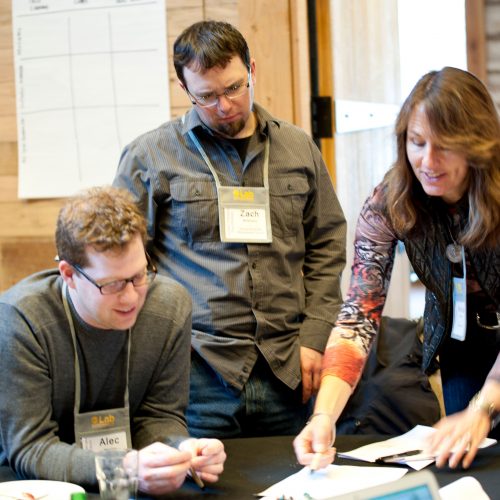
eLab Accelerator 2018
West Oakland Renewable Power
The Port of Oakland's shipping container cranes silhouetted by sunset at golden hour with the full San Francisco skyline in the background.

Project Objective
To develop an implementation plan for community-owned, large-scale industrial solar generation in West Oakland California. We intend to design the business entity; schemes for local small equity investment; and non-cash community benefits like bill offsets, energy efficiency, load management and "negawatts". We will also identify the most likely market for our new renewable energy in the Port of Oakland, Pacific Gas & Electric or the new County CCA East Bay Community Energy. Our goal is to go beyond theory and arrive at a plan for action.

Team Members
- Brian Beveridge, West Oakland Environmental Indicators Project
- James Fine, Environmental Defense Fund
- Dave McDougall, 3 Degrees
- Laura Arreola, Port of Oakland
- Basil Wong, Port of Oakland
- Melissa Brandt, East Bay Community Energy
- Michael Puckett, PG&E
Project Description
West Oakland Renewable Power will create a locally owned energy management company that will coordinate financing and construction of approximately three megawatts of industrial rooftop solar generation and possibly battery storage to complement the needs of community choice aggregation or new industrial load at the Port of Oakland. Either option may serve the goals of the regional independently owned utility, PG&E, in their efforts to replace fossil fueled generation with renewables. WORP will help reduce local pollution and GHG production in accordance with goals of the City of Oakland and its port. The project will compound the pollution reduction benefits with local equity growth, lower energy costs, more effective energy usage and a healthier quality of life.
Progress Made to Date (pre-Accelerator)
Our project champions participated in the eLab Accelerator Project Yukon team, which advanced development of the PG&E Oakland Community Energy Initiative. OCEI could, under some scenario, be a potential offtaker for WORP energy. We have had very promising discussions with a local logistics development company to acquire roof access to their new 400,040 sq ft warehouse to be built at the Port of Oakland. Through discussion with a finance and legal firm we have developed a draft model for local community investment in community-serving infrastructure assets. Such models offer opportunities for significant cash dividends for local small investors plus delivering real value to local low-income residents through efficiency, load-shifting, load management and other innovative technology. Our discussions with the team creating the local development business model for the county CCA, East Bay Community Energy, are helping define the potential for Power Purchase Agreements through possible feed-in tariffs which may be a part of their procurement model. Our project champions have been engaged with the Port of Oakland for some years as advocates for a transition to "zero/near-zero" freight operations. As those goals move forward, the Port's overall energy demands will increase and locally produced, clean, renewable energy and storage presents an attractive sustainability potential. We are in discussions with port management about these possibilities. Generally, the circumstances could not be more ripe for project WORP.
Project Background Information
The West Oakland Renewable Power project grew from our involvement in the 2017 eLab sponsored Project Yukon. That project brought renewable energy and distribution engineers from Pacific Gas and Electric together with a diverse team of stakeholders, including business and community members to discuss opportunities to replace local fossil fueled generation with a suite of renewable energy and load reduction solutions. The possibility of linking new logistics development at the port, energy procurement goals for the new county CCA, statewide zero emission freight targets, and extraordinary community benefits, inspired our vision for a local, community owned, industrial scale rooftop solar generation project. Since there are few, if any, examples of this type of community energy project, our team will be confronted with key questions about the type of legal entity that would define such a business, the the best site access and management agreement, structures for financing and local investment, best options for off-taking of our new generation, and the best suite of tools and technology to reduce or offset local load while still improving comfort and quality of life for local low-income residents. We see Project WORP as a perfect platform from which to explore the real world challenges of bringing renewable energy benefits to an urban development setting.
Post-Accelerator outcomes
At Accelerator, the team mapped the various stakeholders relevant to a community solar project in West Oakland, understanding their needs and offers. Additionally, the team outlined the possibilities, challenges, and opportunities of having different offtakers for a community solar project, to better make decisions going forward. They also outlined prospective sources of funding and how this project could potentially best utilize a portion of the West Oakland Community Fund. Finally, the team defined the community this project seeks to serve, and the array of values the projects is designing for. Moving forward, the project will determine whether they might be able to be a respondent to PG&E and East Bay Community Energy's Oakland Clean Energy Initiative RFO, as well as exploring other potential versions of a community solar project.